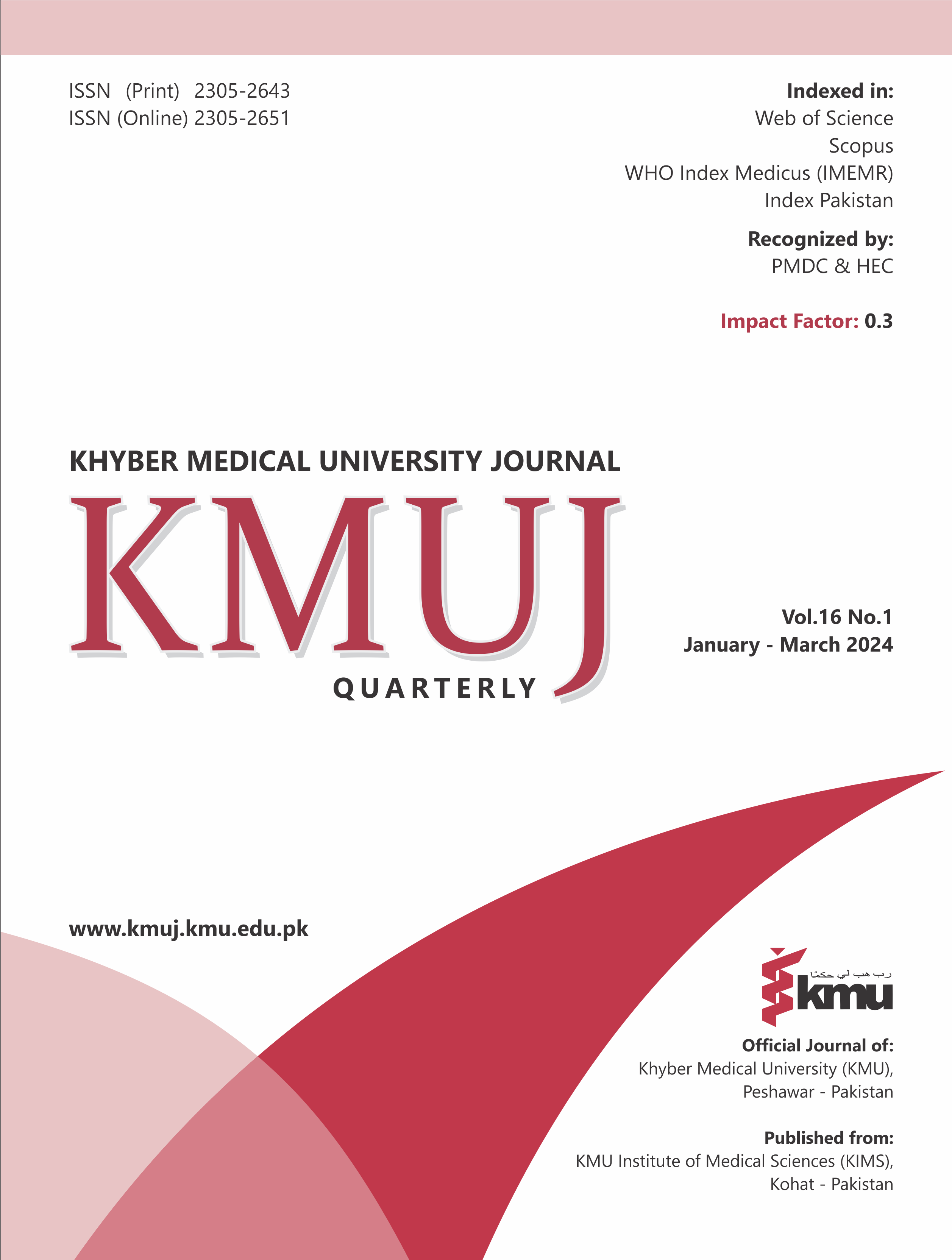Coping strategies, meaning in life and health-related quality of life among young adults with haemophilia
Main Article Content
Abstract
OBJECTIVE: To investigate the association between coping strategies, meaning in life, and health-related quality of life (HRQoL) among young adults with haemophilia.
METHODS: This cross-sectional study was conducted from February 2023 to August 2023 at the Haemophilia Welfare Centre in Lahore, Pakistan. A purposive sampling technique was used to select the sample size of 80 young adults with haemophilia with an age range of 18 to 40 years. Three scales, along with demographic performa were used for data collection. The data was collected by using the World Health Organization Quality of Life Brief Version Scale 16, Coping Scale 14, and Meaning in Life Questionnaire 15, along with demographic performa.
RESULTS: The reliability of all study scales was satisfactory. Study comprised of 40 males and 40 female participants, ranging in age from 18 to 30 years. Most study participants were educated and diagnosed with type A haemophilia. Thirty-five percent of the participants were suffering from moderate levels of haemophilia. Results of the study revealed a significant positive relationship between HRQoL, coping strategies (r =.235*, P<0.01), and meaning in life (r =.468, P<0.01). Regression analysis revealed meaning in life (β =.76, p<.001) as a positive predictor for HRQoL. Coping strategies were found to mediate between meaning in life and HRQoL among young adults with haemophilia.
CONCLUSION: Our study highlights the positive correlation between HRQoL, coping strategies, and meaning in life, with coping strategies partially mediating this relationship. Addressing psychosocial factors is crucial for improving the well-being of individuals with haemophilia.
Article Details

This work is licensed under a Creative Commons Attribution 4.0 International License.
Work published in KMUJ is licensed under a
Creative Commons Attribution 4.0 License
Authors are permitted and encouraged to post their work online (e.g., in institutional repositories or on their website) prior to and during the submission process, as it can lead to productive exchanges, as well as earlier and greater citation of published work.
(e.g., in institutional repositories or on their website) prior to and during the submission process, as it can lead to productive exchanges, as well as earlier and greater citation of published work.
References
Mannucci PM, Tuddenham EG. The hemophilias – from royal genes to gene therapy. N Engl J Med 2001;344:1773-9. https://doi.org/10.1056/NEJM200106073442307
Srivastava A, Brewer AK, Mauser-Bunschoten EP, Key NS, Kitchen S, Llinas A, et al. Guidelines for the management of hemophilia. Haemophilia. 2013;19(1):e1-47. https://doi.org/10.1111/j.1365-2516.2012.02909.x
White GC, Rosendaal F, Aledort LM, Lusher JM, Rothschild C, Ingerslev J, et al. Definitions in hemophilia. recommendation of the scientific Subcommittee on factor VIII and factor IX of the scientific and standardization Committee of the International Society on thrombosis and haemostasis. Thromb Haemost 2001;85:560.
Rodriguez-Merchan EC. Prevention of the musculoskeletal complications of hemophilia. Adv Prev Med 2012;2012:1-7. https://doi.org/10.1155/2012/201271
Soucie JM, Grosse SD, Siddiqi A-E-A, Byams V, Thierry J, Zack MM et al.. The effects of joint disease, inhibitors and other complications on health-related quality of life among males with severe haemophilia A in the United States. Haemophilia 2017;23:e287-93. https://doi.org/10.1111/hae.13275
Von Mackensen S, Gringeri A, Siboni SM, Mannucci PM, Italian Association Of Haemophilia Centres (AICE). Health-Related quality of life and psychological well-being in elderly patients with haemophilia. Haemophilia 2012;18:345-52. https://doi.org/10.1111/j.1365-2516.2011.02643.x
Carvalhosa AM, Henrard S, Lambert C, Hermans C. Physical and mental quality of life in adult patients with haemophilia in Belgium: the impact of financial issues. Haemophilia 2014;20:479-85. https://doi.org/10.1111/hae.12341
O'Hara J, Walsh S, Camp C, Mazza G, Carroll L, Hoxer C, et al.. The impact of severe haemophilia and the presence of target joints on health-related quality-of-life. Health Qual Life Outcomes 2018;16(1):84. https://doi.org/10.1186/s12955-018-0908-9
Coppola A, Cerbone AM, Mancuso G, Mansueto MF, Mazzini C, Zanon E. Confronting the psychological burden of haemophilia. Haemophilia 2011;17:21-7. https://doi.org/10.1111/j.1365-2516.2010.02280.x
Cassis FY, Querol F, Forsyth A, Iorio A. Psychosocial aspects of haemophilia: a systematic review of methodologies and findings. Haemophilia 2012;18(3):e101-e14. https://doi.org/11.1111/j.1365-2516.2011.02683.x
Poon J-L, Doctor JN, Nichol MB. Longitudinal changes in health-related quality of life for chronic diseases: an example in hemophilia a. J Gen Intern Med 2014;29 (Suppl 3):760-6. https://doi.org/10.1007/s11606-014-2893-y
Urzua A, Jarne N. Quality of life and coping styles in people with chronic diseases. Interam J Psychol 2008;42:151-60.
Sarafino EP. Health Psychology: Biopsychological Interactions. Wiley: New York; 2008.
Hamby S, Grych J, Banyard VL. Coping: Appraisals and behaviors. Life Paths measurement packet: Finalized scales. Sewanee, TN: Life Paths Research Program. Accessed on: July 20, 2023. Available from URL: www.lifepathsresearch.org/strengths-measures/
Steger MF, Frazier PA, Kaler M, Oishi S. The meaning in life questionnaire: Assessing the presence of and search for meaning in life. J Couns Psychol 2006;53(1):80-93. https://doi.org/10.1037/0022-0167.53.1.80
World Health Organization Quality of Life Group. The World Health Organization Quality of Life assessment (WHOQOL): position paper from the World Health Organization. Soc Sci Med 1995;41(10):1403-9. https://doi.org/10.1016/0277-9536(95)00112-k
Foubert A, Roussel N, Chantrain VA, Hermans C, Lambert C, Lobet S, et al. Pain coping behaviour strategies in people with haemophilia: A systematic literature review. Haemophilia 2022;28(6):902-16. https://doi.org/10.1111/hae.14627
Wilski M, Gabryelski J, Brola W, Tomasz T. Health-related quality of life in multiple sclerosis: Links to acceptance, coping strategies and disease severity. Disabil Health J 2019;12(4):608-14. https://doi.org/10.1016/j.dhjo.2019.06.003
Lo Buono V, Corallo F, Bramanti P, Marino S. Coping strategies and health-related quality of life after stroke. J Health Psycho 2017;22(1):16-28. https://doi.org/10.1177/1359105315595117
Liu MH, Chiou AF, Wang CH, Yu WP, Lin MH. Relationship of symptom stress, care needs, social support, and meaning in life to quality of life in patients with heart failure from the acute to chronic stages: a longitudinal study. Health Qual Life Outcomes 2021;19(1):252. https://doi.org/10.1186/s12955-021-01885-8
Cuesta-Barriuso R, Torres-Ortuño A, Nieto-Munuera J, López-Pina JA. Quality of life, perception of disease and coping strategies in patients with hemophilia in Spain and El Salvador: a comparative study. Patient Prefer Adherence 2021;15:1817-25. https://doi.org/10.2147/ppa.s326434
